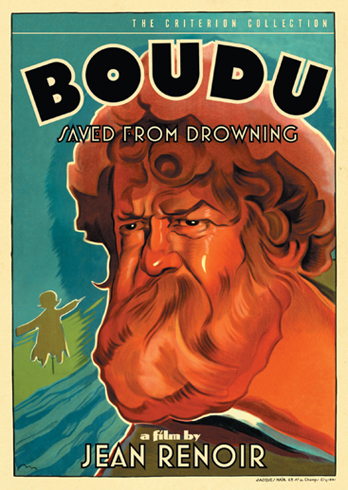
BOUDU SAVED FROM DROWNING (BOUDO SAUVE DES EAUX)
France, 1932, 81 minutes, Black and white.
Michel Simon, Marcelle Hainia.
Directed by Jean Renoir.
Boudu Saved From Drowning is a classic French satiric comedy of the early 1930s. It was directed by Jean Renoir who was to make great impact with his films of the '30s including La Grande Illusion and The Rules of the Game.
The film is based on a play about a tramp who is saved from drowning by a bourgeois family. His interaction with the family means his conversion to their ways. Renoir's film does not have any such conversion. In fact, the opposite. The bourgeoisie are held up to ridicule and Boudu goes on his way. The film is a barbed look at French society in the '30s. Renoir was to do this even more tellingly in The Rules of the Game.
Michel Simon is excellent as the offbeat tramp Boudu, all gawky and scruffy, then smoothly charming, then off on a new quest.
The film was remade by Paul Mazursky in the 1980s as Down and Out in Beverly Hills. The film follows the original fairly closely with Nick Nolte the Boudu character and Bette Midler and Richard Dreyfus as the bourgeois husband and wife. However, at the end of Mazursky's film, the tramp is enticed back to the family-(whether to be changed or to change them further is left up in the air).
1. The work of Jean Renoir? His skills as a director? His vision of French society? The technical accomplishment of an early sound film? Its impact now (and its being remade in the '80s in the U.S.)?
2. The original play and the focus on the bourgeois family? The transition of focus to Boudu and his values, lifestyle? The anarchical touches? The satire on society, class differences, manners and morals, hypocrisies? The clown character who tests values? Its impact in its day? For
French audiences? Later decades?
3. Black and white photography, locations, exteriors, the interiors? The stylishness of the set-ups? The musical score?
4. France in the 1930s: Lestingois and the Bourgeois family? Lestingois as kind and foolish? The scene of his giving books free to the student? His broadminded and liberal attitudes? His relationship with his wife? The affair with Anne-Marie? The drowning and his response, rushing to intervene? His being seen as a hero? Boudu making him responsible? His inviting Boudu into his home, welcoming him? Coping with his way of speaking, manner, dirt etc.? Genial? His affair with the maid being interrupted? His changing attitudes? His wife's infatuation with Boudu? Exasperation? The lottery ticket? His values being challenged?
5. Mrs Lestingois and her snobbery, her disdain for Boudu and his dirtiness? The irony of the well-groomed and manicured Boudu and her being seduced?
6. Anne- Marie and her role as the servant in the house, the affair with the master? Her response to Boudu? her being seduced? Jealousies?
7. Boudu as the wandering tramp, his love for his dog-and his losing it, his values, anarchical touches? His appearance, clothes, beard, dirtiness? His depression with the disappearance of his dog? Into the river? His being saved? His not being grateful, his putting the responsibility on Lestingois? His humorous and satiric behaviour in the house? Meals, talk, sleeping on the floor, interrupting Lestingois and his affair? His being better groomed and his seduction of Madame Lestingois? His relationship with the maid? His not finding any difficulty in these relationships because of Monsieur Lestingois' behaviour? His highlighting the double standards? The celebration? Into the river again? His drifting down and out - and exchanging the clothes for a new life?
8. Boudu and his change at the end? Going on his way - into other people's lives?
9. The theme of manners and morals, values?
10. The film as a classic?